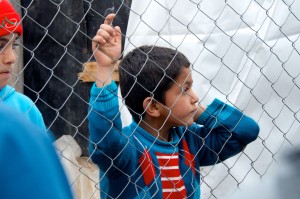The conflict in Syria has been going on for more than four years, and the number of refugees is only growing. According to the United Nations, a quarter of the 22 million Syrians have been forced to relocate within or outside their country. This number is continuously growing as the conflict persists unresolved to this day. Border countries (Jordan, Lebanon, Turkey, and Iraq) have been overwhelmed by the arrival of Syrian refugees. Half of these are children, sometimes arriving with their families—and sometimes alone.
For the children: unparalleled suffering
According to the UN High Commissioner for Refugees (UNHCR), more than a million young Syrians have become refugees, with 800,000 under the age of 11. These children have not only lost their homes or family members, but a part of their childhood as well. As for their future… it is clearly under threat.
The physical changes, fears, stresses, and traumas that refugee children undergo only represent the tip of the iceberg. The UNHCR and UNICEF have shed light on other threats they must endure: slave labor, early marriage, and the risks of sexual exploitation and trafficking.
According to the UNHCR, in the Zaatari camp in Jordan the majority of businesses employ children, and nearly one out of every two households in that country survives, in part or fully, on wages earned by a child.
Syrian refugees in Lebanon
Half of all Syrian refugee children are found in Lebanon. One of them is called Ahmad. Though he attended school in Syria, he has been left uneducated in Lebanon for the last three years. How does he spend his time now? Selling French fries on the side of the road. Only one of his brothers, out of five in total, is able to go to school.
The Lebanese education system is overwhelmed and lacks the capacity to welcome all the young refugees. The refugee children already outnumber Lebanese children in that country. In the “Land of the Cedars,” the government is unable to pay any more teachers. The UNHCR has been offering financial support for an education service focused solely on educating refugee children.
In addition, since education in Lebanon is bilingual (French/Arabic or English/Arabic), Syrian children, who do not speak Arabic, face difficulties following the lessons. Because of traumas they have suffered, some children are unable to read or write, which slows their progress and development considerably. They are completely de-socialized and lack resources.
Who will come to the aid of young Syrian refugees?
The UNHCR and UNICEF currently provide significant assistance. For example, they have committed to vaccinating children in refugee communities against measles. They also offer them psychosocial support and give them the opportunity to continue with their studies. In addition, these two organizations have registered one million children, thereby ensuring their official papers are in order. Despite these efforts and the help of a great many other NGOs, young Syrian refugees continue to live miserably and face an uncertain future.
If the world does not act quickly, a generation of innocents will be sacrificed on the altar of war. They will become a lost generation, without hope, and without a future.
Written by : Ivana Hajzmanova Translated by: Carolyn Yohn Proofread by: Hannah Maley |


